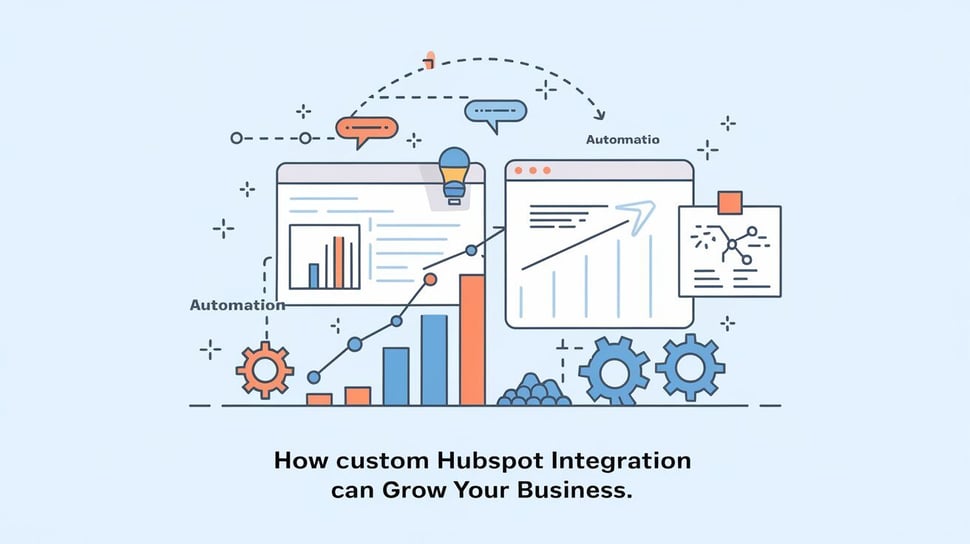
Blog Details
How Custom Integration in HubSpot Can Grow Your Business
- February 11 2025
- Nikias Kray

In today’s fast-paced business environment, having systems that work seamlessly together is essential for growth. While HubSpot offers a range of built-in integrations, they might not cover all your unique business needs. This is where custom HubSpot integrations come in, providing tailored solutions that connect HubSpot with your existing tools and platforms to streamline processes and boost efficiency.
What Is a Custom HubSpot Integration?
A custom HubSpot integration involves connecting HubSpot with other software systems in a personalized way that fits your specific business requirements. Unlike off-the-shelf integrations, custom solutions are designed to meet your operational goals and business processes without compromise.
What Does a Custom Integration Include?
- Data Synchronization: Seamless data exchange between HubSpot and other business systems like CRMs, ERP solutions, or accounting software.
- Workflow Automation: Automating repetitive tasks, such as lead management, invoicing, and reporting, to save time and reduce errors.
- Custom Dashboards & Reporting: Building customized reporting solutions that pull data from various sources for better insights.
- Third-Party API Connections: Integration with niche tools or services that don’t have native HubSpot support.
Who Needs a Custom HubSpot Integration?
Custom integrations are suitable for businesses that:
- Operate in highly specialized industries where standard HubSpot integrations don’t meet specific operational requirements.
- Use multiple software solutions and need to centralize data to improve visibility and collaboration.
- Experience rapid growth and require scalable solutions that adapt to their evolving business processes.
- Need advanced reporting capabilities by combining data from multiple platforms for comprehensive insights.
For example:
- E-commerce companies might integrate HubSpot with their inventory management and order processing systems.
- Financial services businesses can connect HubSpot to compliance software or financial reporting tools.
- SaaS companies can link HubSpot with product usage analytics platforms to better understand customer behavior and reduce churn.

How Does the Integration Process Work?
- Needs Assessment: The process begins with understanding your business goals, existing tools, and integration needs.
- Planning & Design: The integration strategy is developed, including defining data flows, mapping fields between systems, and identifying key automation opportunities.
- Development & Testing: Custom APIs are built to connect systems, followed by thorough testing to ensure data flows correctly and workflows operate as intended.
- Deployment & Monitoring: The integration goes live, with ongoing support and optimization to ensure it continues to meet business needs.
Key Benefits of Custom HubSpot Integrations
Tailored Solutions
Custom integrations allow you to connect HubSpot with other systems in a way that’s specifically tailored to your business needs. This ensures that your workflows are optimized, leading to greater operational efficiency and innovation.
Scalability
Custom integrations can be designed to grow with your business, ensuring that as your operations expand, your systems remain efficient and effective.
Enhanced Data Accuracy
Manual data entry is prone to errors and time-consuming. HubSpot API integrations allow you to automatically transfer data between different platforms, reducing the risk of human error. For example, integrating accounting software or CRM systems ensures data is synchronized in real-time, eliminating duplicate records and maintaining consistent information across all platforms. This boosts efficiency and frees up resources that would otherwise be spent on manual processes.
Improved Decision-Making
Custom API integrations provide access to richer, more comprehensive data insights by pulling information from multiple systems into HubSpot. Instead of manually gathering data from various platforms, you can generate reports within HubSpot using real-time data. This centralized reporting allows for better tracking of KPIs, lead nurturing, and customer behavior analysis. Ultimately, this leads to better forecasting and business strategy.
Competitive Edge
By opting for custom integration, businesses gain more control over their HubSpot ecosystem, leading to greater operational efficiency and innovation. Enhanced functionality includes features not available in native integrations, providing unique capabilities that can set your business apart.
Conclusion
Investing in custom HubSpot integrations opens doors to improved efficiency, seamless workflows, and better data insights. By automating processes and enabling real-time synchronization across various platforms, your business will benefit from increased productivity and enhanced decision-making capabilities. If you’re looking to unlock the full potential of HubSpot, consider exploring custom API integrations to meet your specific needs.
Leave your thought here
Your email address will not be published. Required fields are marked *